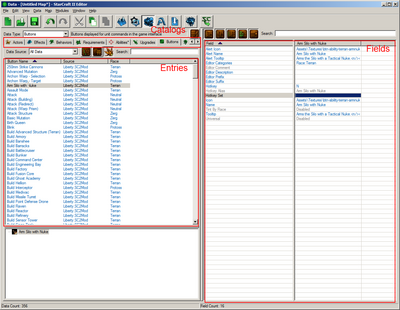Difference between revisions of "Catalogs"
m |
|||
| (3 intermediate revisions by 2 users not shown) | |||
| Line 3: | Line 3: | ||
Catalogs are containers for objects created in data editor. Each object created by the data editor belongs to one of the catalogs, which are distinguished by their function. These objects, or ''catalog entries'', have a type, a parent and fields. | Catalogs are containers for objects created in data editor. Each object created by the data editor belongs to one of the catalogs, which are distinguished by their function. These objects, or ''catalog entries'', have a type, a parent and fields. | ||
| − | + | =Type= | |
Each catalog has a set of types its entries can have, and each entry must have one type (for example [[Weapons]] can be [[Weapon#Generic|Generic]], [[Weapon#Legacy|Legacy]] or [[Weapon#Strafe|Strafe]]). Type defines how the entry is used, and what fields it has. | Each catalog has a set of types its entries can have, and each entry must have one type (for example [[Weapons]] can be [[Weapon#Generic|Generic]], [[Weapon#Legacy|Legacy]] or [[Weapon#Strafe|Strafe]]). Type defines how the entry is used, and what fields it has. | ||
| − | + | =Parent= | |
Each entry can have a parent entry. The entry then inherits it's parent's field values for all the fields it doesn't have specified itself. This helps to save space in map files, as most of the fields will remain unchanged in many cases (for example units have ~100 of fields, of which ~15 are changed. The remaining 85 don't need to be specified, they are inherited from the parent, which is ''generic unit'') | Each entry can have a parent entry. The entry then inherits it's parent's field values for all the fields it doesn't have specified itself. This helps to save space in map files, as most of the fields will remain unchanged in many cases (for example units have ~100 of fields, of which ~15 are changed. The remaining 85 don't need to be specified, they are inherited from the parent, which is ''generic unit'') | ||
| − | + | =Fields= | |
Depending on type and catalog, each entry has several fields that can be set. Fields are displayed in different colors, depending on where was their values set (gray are inherited from core entries, blue are inherited from Liberty entries, light green are inherited from other entries of current map, dark green are defined by this entry). Most of the fields can be read and changed with triggers. | Depending on type and catalog, each entry has several fields that can be set. Fields are displayed in different colors, depending on where was their values set (gray are inherited from core entries, blue are inherited from Liberty entries, light green are inherited from other entries of current map, dark green are defined by this entry). Most of the fields can be read and changed with triggers. | ||
Regardless of catalog, each entry has several fields prefixed with ''Editor-''. All of these fields are editor-only notes for you or anyone else, who might use your resources. | Regardless of catalog, each entry has several fields prefixed with ''Editor-''. All of these fields are editor-only notes for you or anyone else, who might use your resources. | ||
| − | + | =The list= | |
Below is the list of most important catalogs (most used): ''(should be expanded to list of all catalogs in the future)'' | Below is the list of most important catalogs (most used): ''(should be expanded to list of all catalogs in the future)'' | ||
*[[Units]] | *[[Units]] | ||
| Line 31: | Line 31: | ||
*[[Turrets]] | *[[Turrets]] | ||
*[[Item classes]] | *[[Item classes]] | ||
| − | *[[Item | + | *[[Item containers]] |
| − | *[[Models]] | + | *[[Models (Catalog)|Models]] |
There are many others, but they are either rarely modified, or contain just few entries. | There are many others, but they are either rarely modified, or contain just few entries. | ||
Latest revision as of 18:45, 8 April 2012
Catalogs are containers for objects created in data editor. Each object created by the data editor belongs to one of the catalogs, which are distinguished by their function. These objects, or catalog entries, have a type, a parent and fields.
Type
Each catalog has a set of types its entries can have, and each entry must have one type (for example Weapons can be Generic, Legacy or Strafe). Type defines how the entry is used, and what fields it has.
Parent
Each entry can have a parent entry. The entry then inherits it's parent's field values for all the fields it doesn't have specified itself. This helps to save space in map files, as most of the fields will remain unchanged in many cases (for example units have ~100 of fields, of which ~15 are changed. The remaining 85 don't need to be specified, they are inherited from the parent, which is generic unit)
Fields
Depending on type and catalog, each entry has several fields that can be set. Fields are displayed in different colors, depending on where was their values set (gray are inherited from core entries, blue are inherited from Liberty entries, light green are inherited from other entries of current map, dark green are defined by this entry). Most of the fields can be read and changed with triggers. Regardless of catalog, each entry has several fields prefixed with Editor-. All of these fields are editor-only notes for you or anyone else, who might use your resources.
The list
Below is the list of most important catalogs (most used): (should be expanded to list of all catalogs in the future)
More advanced
There are many others, but they are either rarely modified, or contain just few entries.
